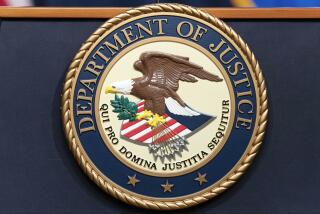Federal ‘Sting’ Nets Yugoslav Consul, Banker : Money-Laundering Plan Involved Drugs, Possible Spying, Officials Say
- Share via
WASHINGTON — The Yugoslav consul general in Chicago, a Yugoslav bank, the chairman of its New York branch and two others were indicted Thursday on money-laundering charges in a federal sting operation that officials said involved illegal drug proceeds and possibly espionage.
Arrests were made as $2 million in cash was about to be flown from Philadelphia to Chicago, where Yugoslav Consul Gen. Bahrudin Bijedic allegedly was ready to stash it into a diplomatic pouch and fly it to Yugoslavia for laundering.
Shortly after the arrest of Bijedic near a Chicago airport, the Yugoslav Embassy here lodged a protest at the State Department, claiming that he was protected by diplomatic immunity. A State Department official said that the Yugoslav charge d’affaires had been “summoned,” rather than coming in voluntarily, as an embassy aide had described it earlier.
“We are not saying that the consul general was involved in the drug operation but that he was laundering money that was coming from drug trafficking,” said the State Department aide, who declined to be identified by name.
She said that the State Department considers consular officials immune only for acts carried out in their consular function and contends that they do not enjoy the broader form of diplomatic immunity against any arrest.
A Customs Service official, who also refused to speak for attribution, said that there had been a fierce debate within the government over whether to arrest Bijedic.
A source close to the investigation said search warrants had been issued to look for evidence that another defendant in the case, a Yugoslav native named Vjekoslav Spanjol, had used his Texas janitorial service to go through the trash of defense contractors so that he could send spy data to the Yugoslav government.
Also indicted by a federal grand jury in Philadelphia were the LBS Bank of Yugoslavia; its New York branch chairman, Vinko Mir; Larry Everett Card, an international banker from Chattanooga, Tenn., and Hubert Francis Cole of Carrollton, Tex.
Cole was described by the Customs Service as “a self-proclaimed money laundering expert and a one-time financial adviser to the Patriot Society, a nationwide group of tax protesters.”
The defendants are accused of using the Yugoslav bank and sham corporations to conceal the international movement of nearly $1.5 million in undercover government funds. According to the indictments, the defendants were told that the money was owned by organized crime and was intended for use in the export of restricted high-technology equipment and armaments.
The sting operation, dubbed “Flying Kite,” began 18 months ago when a Customs Service undercover agent was introduced to Card, who then introduced him to Cole, the government said. When laundering problems developed at a Bermuda bank, Cole allegedly called in Spanjol to help.
The indictments charge that Cole and Spanjol then illegally transported large sums of undercover money to Yugoslavia, where it was deposited in banks. Then, in the name of sham corporations, the money was wired back to accounts in the United States, concealing its true source, it was alleged.
Bijedic was charged with helping to stash funds in a trunk bearing diplomatic seals so that the money could be exported to Yugoslavia without filing the required currency reports.
The Yugoslav bank and its chairman were accused of joining in the operation by filing false currency transaction reports with the Internal Revenue Service.
Staff writer Don Shannon contributed to this story.
More to Read
Sign up for Essential California
The most important California stories and recommendations in your inbox every morning.
You may occasionally receive promotional content from the Los Angeles Times.













